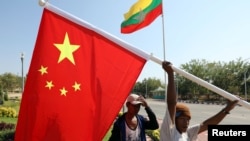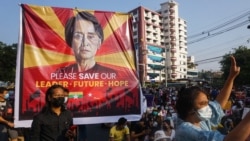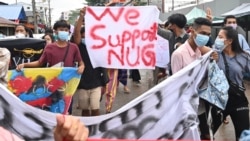Analysts say China's recent invitation of Myanmar's ousted pro-democracy party to a regional summit is an old move from its foreign policy playbook aimed at burnishing its bruised image in Myanmar and helping protect its economic and strategic interests there.
Even as Beijing forges ever-closer ties with the junta that seized power February 1, China's Communist Party openly welcomed the deposed National League for Democracy to a September 9 virtual summit of South and Southeast Asian political parties.
"There is resentment on the public opinion side that China needs to deal with, and to engage NLD and to show that China still remembers and still maintains relationships with NLD is aimed in this direction," said Yun Sun, China program director at the Stimson Center, a Washington research organization.
Damage control
Across most of Myanmar, and its majority ethnic Burman heartland especially, the NLD is loved almost as much as the military is loathed.
With pro-democracy icon Aung San Suu Kyi at its helm, the party leaped to power in 2015 elections that ended decades of absolute military rule. The NLD won a second landslide at the polls in 2020 before the generals seized power while claiming, without evidence, that the party had rigged the vote.
Incensed by China's support of the junta — it dismissed the coup as a "cabinet reshuffle" and watered down a United Nations Security Council resolution condemning the putsch — Myanmar's pro-democracy forces have trained much of their ire on their big neighbor. Chinese-owned factories have gone up in flames. Boycotts target Chinese products. Social media posts suggest blowing up pipelines China has laid across the country to funnel vital oil and gas imports from the Middle East to its landlocked provinces.
With Suu Kyi and dozens of other NLD lawmakers in custody and the rest in hiding, Sun said China is not keeping in touch with the party to hedge against the new regime's collapse.
"At this moment I would say that China is convinced that the junta has succeeded," she said.
Sun stressed that China has been reaching out to the NLD via the Communist Party and not its Foreign Affairs Ministry, using a well-worn path in Beijing's triple-track diplomacy that keeps relationships with other countries separated between parties, states and militaries.
"This is a party-to-party platform. It does not in any way indicate state-to-state recognition or state-to-state relations. This is a completely different track," Sun said.
By at least keeping party ties alive, though, she said China is hoping to show the people of Myanmar that it has not forgotten them, and to preserve the option of calling on the NLD to come to its defense should anti-China sentiment flare up again. China and the NLD-led government had fostered fairly friendly relations in the years leading up to the coup.
"These types of levers, leverages, and also channels of influence through NLD is still quite important for China. I don't think China will use it now, but to maintain the relationship is always better than not maintaining the relationship," Sun said.
A double game
China has long played this sort of "double game" in Myanmar, said Lucas Myers, an Asia analyst at the Wilson Center, another U.S. think tank.
China's weapons sales, for example, have been arming both Myanmar's military and some of the ethnic minority rebel groups the military has been battling along the country's border with China for decades, giving Beijing some leverage over the conflict.
In a recent guest column for Foreign Policy magazine, Myers said China's latest double game with the junta and NLD could backfire if it only ends up riling them both. On the other hand, he added, if it helps keep them both onside, "China could see its influence expand and interests advanced."
Richard Horsey, a Myanmar analyst and senior adviser to the International Crisis Group, told VOA that the NLD also gives China a useful backchannel to the so-called National Unity Government.
Pulling together ousted lawmakers, ethnic minority groups and other opposition players, and operating from the shadows, the NUG claims to be Myanmar's true government in a direct challenge to the military regime. Unlike the NLD, the regime has outlawed the NUG as a terrorist organization.
"To the extent that China is engaging with the NUG, I think it's framing it as engagement with NLD, given that NUG has a lot of NLD people in it," Horsey said. "That gives it some wiggle room to continue to engage and then to say to the regime with a straight face, well, we're just engaging with the NLD party as we always have and what's wrong with that, aren't they still legal?"
Staying alive
The NLD is legal for now, but for how much longer is an open question.
Thein Soe, an ex-general handpicked by the junta to lead the regime's election commission, has already suggested dissolving the NLD for "fraud," a claim the party and international election observers have dismissed. By putting the NLD's leaders on trial, many believe the junta is laying the groundwork to ban the party.
Horsey said China would then find it much more awkward to stay in touch with the NLD, and by extension the NUG. He said sources have told him China's Asian affairs envoy, Sun Guoxiang, pushed the junta "quite hard" not to dissolve the party on a visit to Myanmar in August. The Irrawaddy, a local news outlet, reported similar appeals from China last month, also citing informed sources.
Horsey, though, is not sure China will get its way.
As important as China is to the junta for its cash, weapons and diplomatic cover, he said keeping the NLD out of the elections the generals have promised to hold by 2023 may be more important.
"A core part of the regime's roadmap is to hold new elections in two years without the NLD or Aung San Suu Kyi being able to participate … so I think it's still quite likely that the regime will move at some point to disband the NLD," he said.
"It [the regime] may be able to be influenced around the edges, but it's not like China could just turn around to the regime and tell it to do this or that and the regime would feel it had to do so," he added.
According to The Irrawaddy, Sun Guoxiang reportedly asked the generals to meet Aung San Suu Kyi during his visit but the generals refused.











